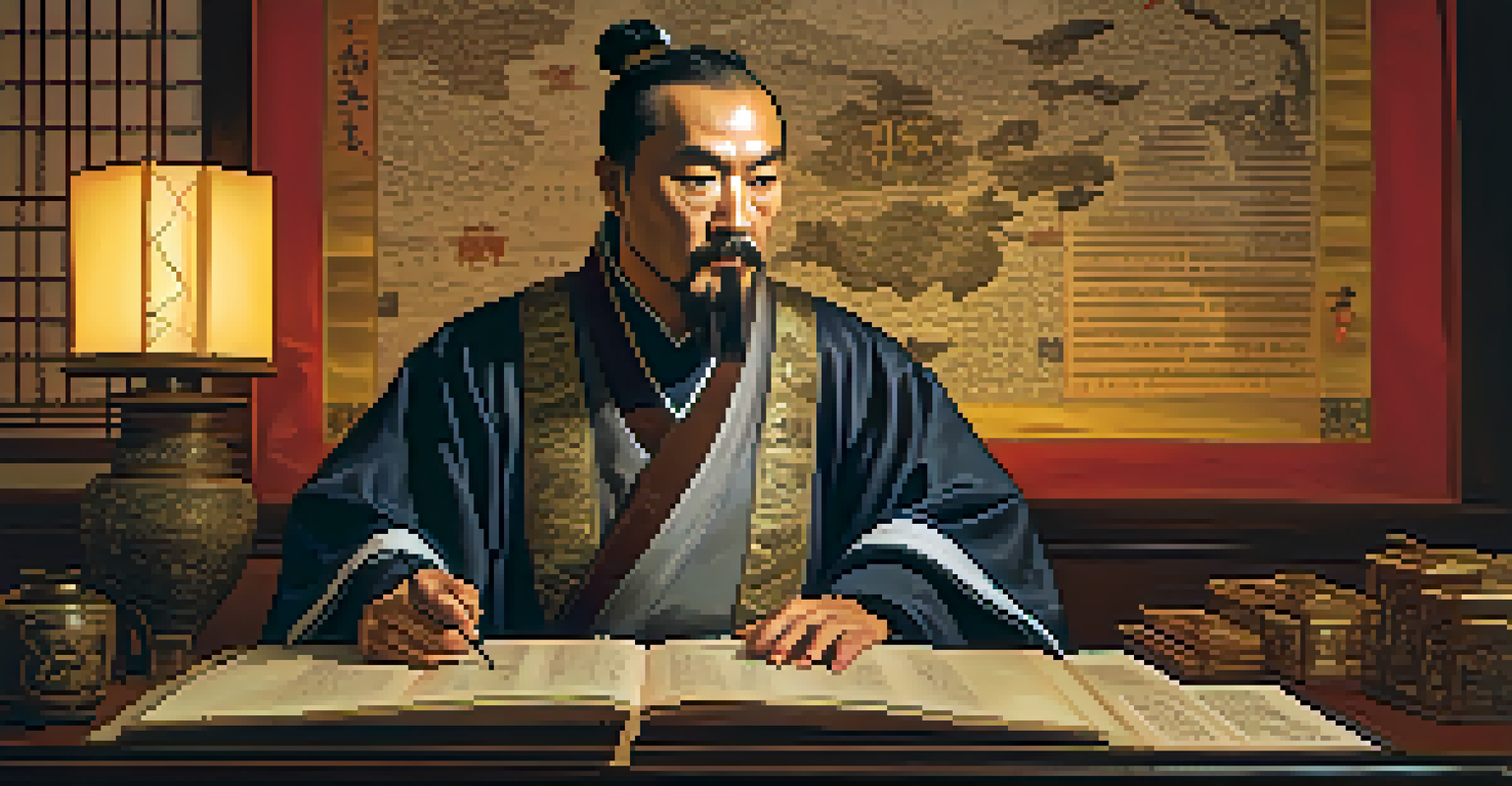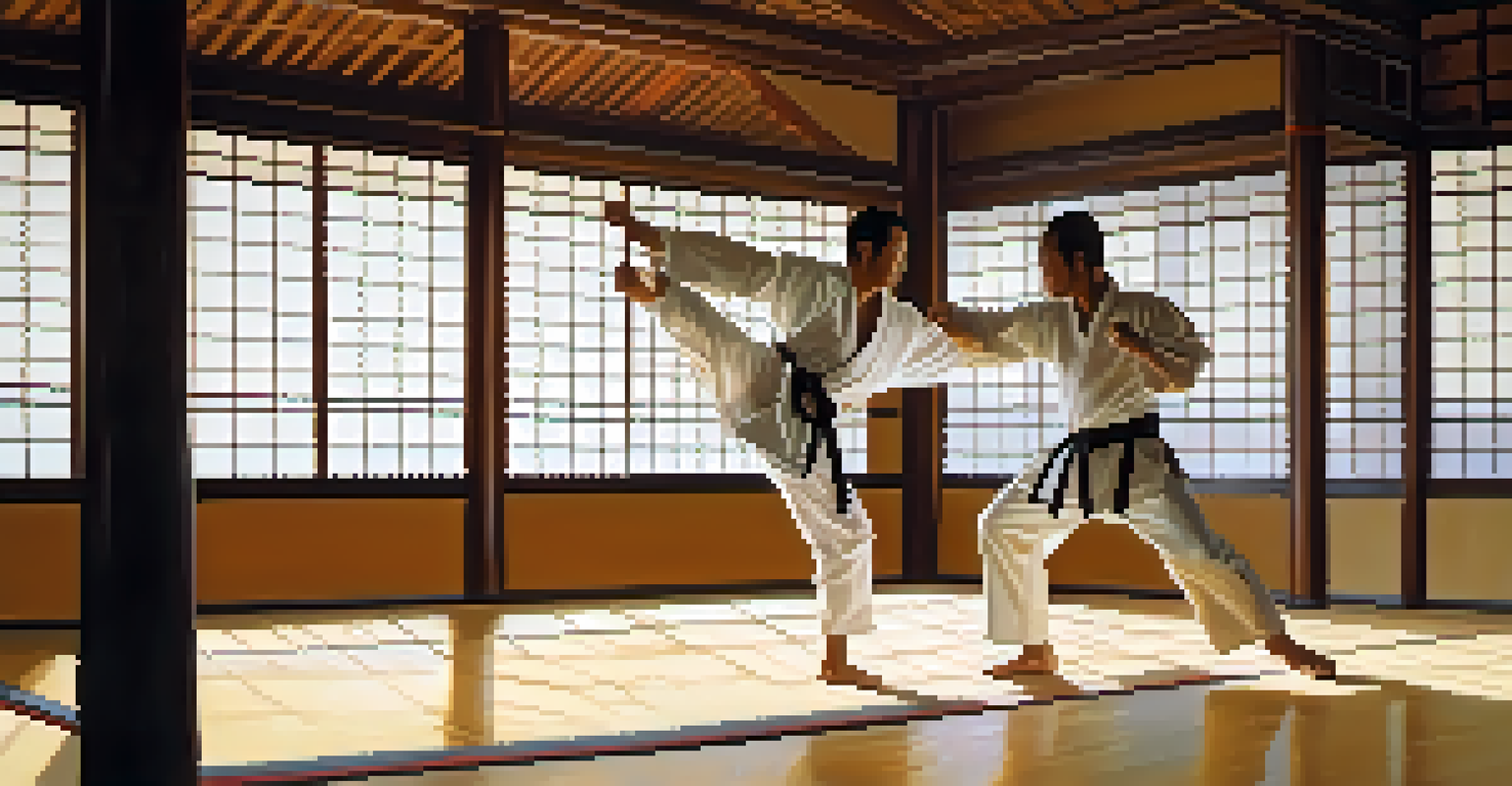Historical Impact of Sun Tzu on Chinese Martial Arts

Introduction to Sun Tzu and His Legacy
Sun Tzu, a military strategist from ancient China, is best known for his work, 'The Art of War.' His ideas extend beyond the battlefield and have significantly influenced various aspects of Chinese culture, including martial arts. The principles he laid down emphasize strategy, discipline, and adaptability, qualities essential for martial artists.
All warfare is based on deception.
Understanding Sun Tzu's impact requires recognizing the historical context in which he wrote. During the Warring States period, China was fragmented, and his teachings helped unify thought around strategy and conflict resolution. This framework not only shaped military tactics but also found its way into the philosophies underpinning martial arts practices.
As martial arts evolved over centuries, the integration of Sun Tzu's principles became evident. From the way techniques were taught to the mindset of practitioners, his influence transformed martial arts into a discipline that valued mental and strategic prowess alongside physical skill.
Core Principles of 'The Art of War'
'The Art of War' outlines several core principles, such as the importance of knowing oneself and the enemy. This idea is foundational in martial arts, where understanding an opponent's strengths and weaknesses can dictate the outcome of a match. Practitioners are taught to assess situations and adapt their tactics accordingly, mirroring Sun Tzu's strategic approach.

Another significant principle is the value of deception. Sun Tzu famously stated, 'All warfare is based on deception.' In martial arts, this translates to techniques like feints and misdirection, which are essential for outsmarting opponents. The ability to create openings and exploit vulnerabilities is a skill refined through training and reflects Sun Tzu's insights.
Sun Tzu's Strategies Shape Martial Arts
His principles of strategy, adaptability, and mental discipline fundamentally influence martial arts training and philosophy.
Additionally, the concept of flexibility is crucial in both Sun Tzu's teachings and martial arts. He advocated for adaptability in response to changing circumstances. This idea resonates with martial artists who must adjust their strategies in real-time during sparring or competition, demonstrating that mental agility is just as vital as physical prowess.
Martial Arts as a Reflection of Philosophical Thought
The philosophical underpinnings of martial arts are deeply intertwined with Sun Tzu's concepts. Many martial arts schools emphasize the importance of mental discipline, focus, and the philosophical aspects of combat. This connection elevates martial arts from mere physical practice to a holistic discipline that nurtures both body and mind.
Know thyself and know thy enemy.
Sun Tzu's influence is particularly evident in styles like Tai Chi, which emphasizes yielding and adaptability. Practitioners learn to flow with the energy of their opponents, much like the strategic maneuvers outlined in 'The Art of War.' This philosophical alignment showcases how martial arts are not just about fighting but also about understanding oneself and one's environment.
Moreover, the integration of strategy into training regimens reflects a broader cultural appreciation for Sun Tzu's teachings. Many martial artists study his work to gain insights into their practice, further demonstrating the lasting impact of his philosophy on the martial arts community.
Historical Development of Martial Arts Techniques
Over the centuries, various martial arts styles emerged in China, each incorporating Sun Tzu's teachings to some extent. For example, traditional styles like Shaolin Kung Fu and Wing Chun have woven these strategic principles into their techniques and forms. This historical evolution showcases how martial arts adapted to the changing landscapes of conflict and culture.
As martial arts spread throughout China and beyond, the influence of Sun Tzu remained a constant thread. Schools often emphasize a strategic mindset in their training, encouraging students to think critically about their movements and decisions. This approach aligns with Sun Tzu's notion that 'the skillful fighter puts himself into a position which makes defeat impossible.'
Philosophical Foundations in Combat
Sun Tzu's teachings elevate martial arts beyond physical practice to a holistic discipline that nurtures both body and mind.
The modernization of martial arts in the 20th century also saw a resurgence of interest in Sun Tzu's philosophies. As martial arts became more popular worldwide, instructors began to incorporate his teachings into their curriculums, fostering a deeper understanding of both the art and the mindset required for mastery.
Influence on Modern Martial Arts Practices
Today, many martial arts schools around the globe continue to draw from Sun Tzu’s teachings. Modern practices emphasize not just physical training but also strategic thinking and mental preparation. This comprehensive approach reflects the timeless relevance of his ideas in cultivating well-rounded martial artists.
Moreover, competitive martial arts have embraced these teachings. Fighters often study strategies from 'The Art of War' to gain an edge in tournaments. The principles of knowing the opponent and adapting tactics play a crucial role in success, showcasing how ancient wisdom remains applicable in contemporary settings.
Additionally, seminars and workshops frequently include discussions on Sun Tzu's philosophies, highlighting their importance in martial arts education. This integration of historical context into training enriches the learning experience, encouraging students to think beyond physical techniques and appreciate the strategic depth of their practice.
Sun Tzu's Impact on Martial Arts Philosophy
The philosophical impact of Sun Tzu on martial arts extends beyond technique and strategy; it encompasses a mindset of continuous learning and adaptation. His teachings encourage martial artists to view challenges as opportunities for growth, promoting resilience and perseverance. This mindset is vital not just in combat, but also in life.
Many martial artists embody Sun Tzu's wisdom through their dedication to self-improvement. They recognize that mastery requires not only physical ability but also mental fortitude. This holistic perspective fosters a deeper appreciation for the art form and enhances practitioners' overall development.
Enduring Legacy of Sun Tzu's Wisdom
The timeless relevance of his insights continues to inspire modern martial artists, fostering growth and ethical conduct.
Furthermore, the emphasis on ethical conduct in martial arts can be traced back to Sun Tzu's philosophies. His teachings encourage respect for opponents and understanding of the broader context of conflict. This ethical foundation cultivates a sense of responsibility among martial artists, reinforcing the idea that martial arts is about more than just fighting.
Conclusion: The Timeless Relevance of Sun Tzu
In conclusion, Sun Tzu's impact on Chinese martial arts is profound and enduring. His strategic insights and philosophical teachings have shaped not only the techniques used in various martial arts but also the mindset of practitioners. By integrating these principles into their training, martial artists continue to honor his legacy.
As martial arts evolve in a modern context, the relevance of Sun Tzu’s teachings remains clear. The blend of strategy, adaptability, and ethical conduct is essential for success in both martial arts and life. This timeless wisdom continues to inspire new generations of martial artists, ensuring that Sun Tzu's influence endures.

Ultimately, the enduring legacy of Sun Tzu serves as a reminder that martial arts is a journey of self-discovery, strategy, and growth. By embracing his principles, practitioners can enhance their skills while also cultivating a deeper understanding of themselves and the world around them.